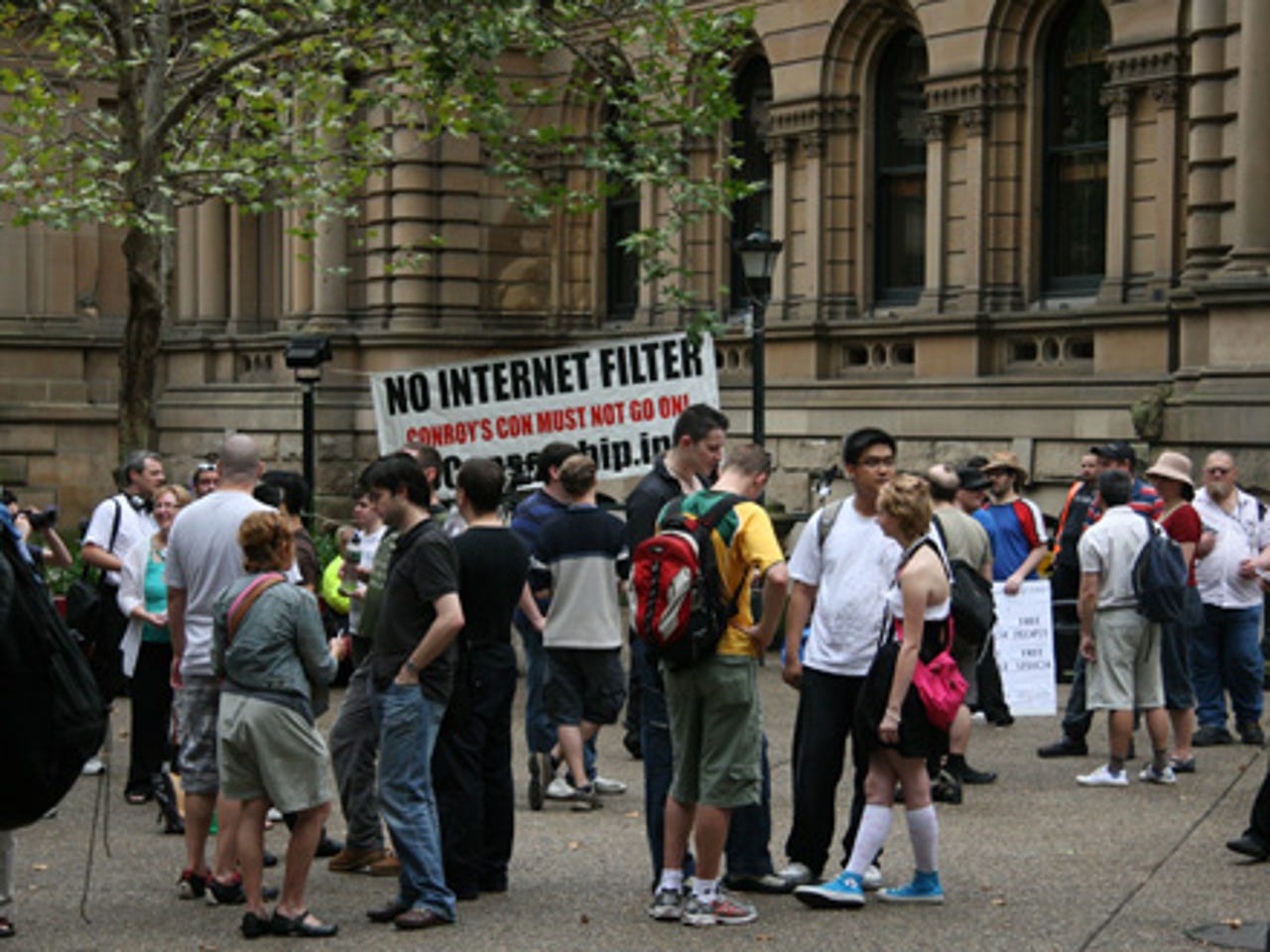Photos: Sydneysiders protest internet filtering


Protesters gathered outside the Sydney Town Hall at 11am on Saturday, despite a day that promised 37-degree heat.
By midday, crowds had swelled to between two and three hundred protesters.
There was a diverse range of banners, including those comparing the Labor Government's promised internet filtering to Stalinist Russia.
This is Derrick, one of the protesters against internet filtering.
"I am here because I think this proposal from the government sucks," he said. "It's not right in a democracy, and it's not right technologically."
Derrick said he would still object to a filter that allowed users to opt-out. "I think there would still be risks to it, because you might be able to opt-out today but in five years time they might change the law."
Derrick said he heard about the protest through the website, www.nocensorship.info.
The first speaker was Danny Yee from Electronic Frontiers Australia, a group that promotes civil liberties on the internet.
"The government is still treating the internet like a broadcasting medium," Yee said, "so they are applying film classification guidelines to them, even the static internet."
Yee said that internet censorship could potentially extend to anything in Australia that has been refused classification, including all X-rated content.
This is Ewen, one of the protesters.
"I just think that blocking the internet is a complete waste of time and money — mostly because it's impossible," Ewen said. "The people who want to get around the filters will get around them."
Ewen said that he heard about the protest through the popular micro blogging service Twitter. "I'm a bit of a Twitter addict," Ewen revealed.
Ewen said that even if internet filtering allowed him to opt-out, he would still object to it. "I think there are better ways to filter the internet, if you want to filter it, you do it in a household not at the core," he said.
The crowd size peaked soon after the first speeches began.
This is Daniel.
"Basically, I have been following the whole internet filtering [issue] that Conroy has put up, and I am highly opposed to it," he said, due to "the amount money they are spending on it, and the lack of effectiveness it will have technically."
Daniel said that the money could be spent on far more effective measures to protect children.
Daniel says that if the filtering was opt-out, he would "not entirely" be opposed, however "the government already has net filtering software that individuals can install on their own computer."
Daniel said he has seen news of the protest on numerous websites, namely Whirlpool and Slashdot.
One of the speakers was a representative from the Australian Sex Party, Fiona Pattern. (Don't search that at work, here is their website). Pattern is also the CEO of the Eros Association, a lobby group for adult entertainment and retail.
Pattern, said "we are sending censorship back about 30 years ... we can't even have an adult computer game in Australia, [this] seems to be run and organised by absolute luddites."
"When they talk about 10,000 sites being blacklisted — I don't know if they have Googled sex recently, but I'm afraid that there is actually a few more than 10,000 out there."
A range of creative banners were made for the protest.
This is Jon. "I am opposed to the government's mandatory ISP level filtering," said Jon. "I believe that it will be ineffective for the objectives that they are attempting to achieve ... and it's setting up a mechanism for future governments to control [freedom of speech]."
Jon runs two blogs on the issue, Broadbanned Revolution and Filtering Fallacies.
Jon said there would still be dangers with an opt-out filter. "The problem with an opt-out filter is that everyone gets it, and if they chose in the future to remove the opt-out nature of it, it's very easy to make it mandatory for everyone."
Jon said he heard about the protest through the website Somebody Think of the Children.
Colourful and creative T-shirts were a feature of the protest. This protester came wearing a T-shirt bearing the slogan "Don't Take My Porn".